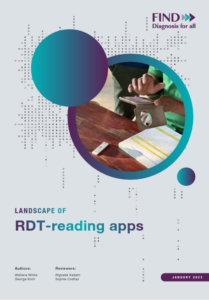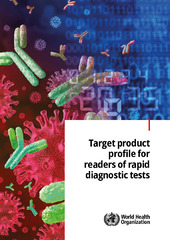
Landscape of RDT-reading apps
Rapid diagnostic tests (RDTs) based on lateral flow assays have emerged as
Diagnostics are a fundamental component of patient care as robust detection of diseases is essential to support an effective clinical plan. However, despite tremendous progress in global health, millions of people still lack the right diagnostic tools and technologies needed to combat health challenges. In the first phase of the diagnostic journey, research and development (R&D) helps address this challenge by translating an idea or concept into diagnostic tools and technologies, which can be used to identify conditions and address health needs.
Reliable and affordable diagnostics have been identified as essential tools in the global response to combat the COVID-19 pandemic. Yet, when the pandemic hit, there were no COVID-19 in-vitro diagnostic (IVDs) tools and technologies available to detect or screen for SARS-CoV-2. Years of under-investment in diagnostics, coupled with a lack of coordination in R&D efforts, meant that both high- and low-income countries did not have the diagnostic tools and technologies to contain and effectively respond to the pandemic.
Without COVID-19 IVD tools and technologies, countries are unable to respond effectively. As the COVID-19 pandemic grew, monetary and non-monetary resources were mobilized through the ACT-Accelerator platform on a scale and timeline never seen before. The ACT-Accelerator Diagnostics Pillar partnership, through the support of its working group partners, has been using these resources to fast-track the development of quality-assured IVD tools and technologies for COVID-19 testing and surveillance.
With the support of partners, the following key activities were prioritized to support R&D efforts:
R&D investments in COVID-19 IVD tools and technologies led to SARS-CoV-2 tests being one of the first tools deployed as part of the global response to the pandemic. The rapid development and rollout of these tests helped countries to understand transmission dynamics, create surveillance programmes, and implement timely medical (vaccines, oxygen, therapeutics) and non-medical counter-measures to safeguard communities. Notable R&D achievements are highlighted. To learn more about the R&D achievements and work, refer to the key learnings and resource section below.
for first automated PCR tests
to become available
for first rapid tests to be approved for emergency use
commercialized COVID-19
tests independently evaluated
commercially available
COVID-19 tests

Rapid diagnostic tests (RDTs) based on lateral flow assays have emerged as

Rapid diagnostic tests (RDTs) have played a critical role in the global
© All Rights Reserved 2023
The ACT-A Dx Knowledge Hub is hosted by FIND on behalf of the ACT-Accelerator Diagnostics Pillar partnership.